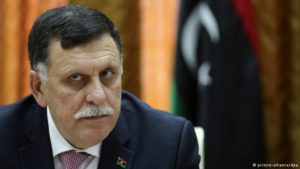
Libya’s U.N.-backed unity government met Western and regional powers on Monday to seek their help as it tries to establish authority over a country divided by armed factions and threatened by Islamist insurgents.
Germany’s foreign minister said it was still unclear if the Government of National Accord (GNA), which sailed into Tripoli on March 30, would be able to end the bloody chaos that Libyans have endured since Muammar Gaddafi’s fall five years ago.
“The decisive question is whether Libya, directly on Europe’s southern border, remains a place where terrorism, the crime of human trafficking and instability keep spreading or whether we and the GNA will be able to restore stability and the rule of law,” Frank-Walter Steinmeier told reporters as he arrived at the talks in Vienna.
“This is an open question at the moment.”
As the talks began, U.S. Secretary of State John Kerry met Fayez Seraj, prime minister of the GNA which is supposed to replace the two rival administrations – one based in Tripoli, the other in the eastern city of Tobruk – that have been battling each other for more than a year.
It has won the backing of factions in western Libya but the Tobruk parliament has yet to accept it. Both sides command the loyalty of armed brigades that have fought for power and oil wealth in the North African country, an OPEC member.
The West sees the GNA as the best hope to defeat Islamic State, which has seized pockets of territory, and to stop the smuggling of migrants across the Mediterranean to Europe.
“I think they’re going to ask for military assistance,” a senior U.S. official told reporters ahead of the talks co-hosted by the United States and Italy.
“We want to see a co-ordinated national effort against Daesh (Islamic State) and we want to see it secure its land and maritime borders.”
The U.S. official said he hoped Monday’s meeting would “show the international community lining up unambiguously behind the GNA as the recipient of security assistance in Libya,” adding that the GNA would be expected to do its part.
“We expect the Libyans will make commitments about their next steps on security and that the countries participating will, in turn, commit to helping.”
President Barack Obama has ruled out sending combat troops, but the Washington Post reported last week that special operations personnel have been stationed at two outposts in eastern and western Libya since late 2015 to line up local partners in advance of a possible offensive on Islamic State.
A spokesman for the GNA-backed military operations room, based in the western Libyan town of Misrata, when asked by Reuters to comment, denied the presence of any U.S. forces.
The United States has already conducted air strikes against Islamic State militants in Libya.
French and British military advisers have also been operating on the ground, sources in Libya and from those two countries have said. Both Paris and London have ruled out direct military intervention.